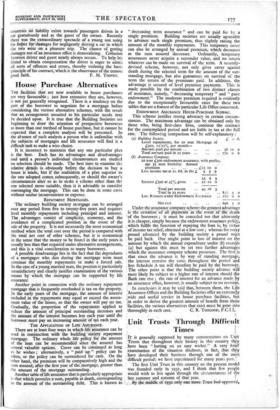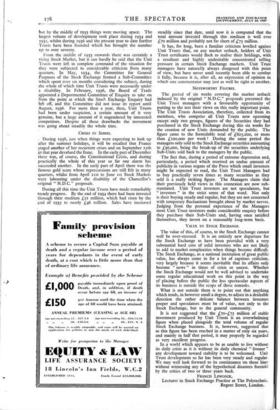Unit Trusts Through Difficult Times
IT is generally supposed by many commentators on Unit Trusts that throughout their history in this • country they have been " batting on an easy wicket." A very brief examination of the situation discloses, in fact, that they have developed their business through one of the most difficult periods we have experienced for many years past.'
The first Unit Trust in this country on the present model was founded early in 1931, and I think that few people would wish to live again through the circumstances of the late summer and autumn of that year. By-tlae-mitldle of 1932-only-one -mere-_Trust-had-appeeredi, but by the middle of 1933 things were moving apace. The largest volume of development took place during 1934 and 1935, whilst during 1936 and the present year to date further Trusts have been founded which has brought the number up to over seventy.
From the middle of 1933 onwards there was certainly a rising Stock Market, but it can hardly be said that the Unit Trusts were left in complete command of the situation for they were subjected to considerable criticism from many quarters. In May, 1934, the Committee for General Purposes of the Stock Exchange formed a Sub-Committee Which spent over six months considering the subject, during the whole -of which time Unit Trusts were necessarily under a disability. In February, 1936, the Board of Trade appointed a Departmental Committee of Enquiry to take on from the point at which the Stock Exchange Enquiry had left off, and this Committee did not issue its report until August, 1936. For more than a year, then, Unit Trusts had been under suspicion, a certain amount of it very genuine, but a large amount of it engendered by interested competitors. Despite all these drawbacks the movement was going ahead steadily the whole- time.
CRISES IN SERIES.
- During 1936, just when things were expecting to look up after the summer holidays, it will be recalled that France staged another of her recurrent crises and on September 25th in that year devalued the franc. In the early part of December there was, of course, the Constitutional Crisis, and during practically the whole of this year so far one alarm has succeeded another. In the early part of April there was the famous gold scare whose repercussions are still felt in many quarters, whilst from April 21st to June 1st Stock Markets were labouring under the disability of the Chancellor's original " N:D.C." proposals.
During all, this time the Unit Trusts have made remarkably steady progress. By the end of 1934 there had been invested through their medium £21 million, which had risen by the grid of 1935 to nearly £46 million. Sales have increased steadily since that date, until now it is computed that the total amount invested' through this medium is well over £70 million and probably not far short ..o£_£75 million. - .
It has, for long, been a familiar criticism levelled against Unit Trusts that, on any market setback, holders of Unit Trust certificates would flock to realise their holdings, with a resultant and highly undesirable concentrated selling pressure in certain Stock Exchange markets. Unit Trust managers have naturally always disagreed with this point of view, but have never until recently been able to combat it fully, because it is, after all, an expression of opinion in which one commentator may just as well be right as another.
NOTEWORTHY FIGURES.
The period of six weeks covering the market setback induced by the original " N.D.C." proposals presented the Unit Trust managers with a favourable opportunity of putting to the test their views on this really important point. The Unit Trusts Association, therefore, collected from its members, who comprise all Unit Trusts now operating except only two groups, figures of the Securities they had purchased in the Stock Exchange during this six weeks for the creation of new Units demanded by the public. The figure came to the formidable total of £625,00o, or more than Doo,000 per week ! During the same period the managers only sold to the Stock Exchange securities amounting to £9o,000, being the break-up of the securities underlying Sub-Units sold back to the managers by the public.
The fact that, during a period of extreme depression and, particularly, a period which received an undue amount of publicity in various organs of the Press which small investors might be expected to read, the Unit Trust Managers had to buy practically seven times as many securities as they sold is a really striking figure. The Managers claiin that their previously held views in this connexion are now sub- itantiated. Unit Trust investors are not speculators, but " investors " in the strict sense of that word. Not only is their buying steady and regular, but they are not concerned with temporary fluctuations brought about by market nerves. Judging from the personal experience of the Managers most Unit Trust investors make considerable enquiry before they purchase their Sub-Units and, having once satisfied themselves, they invest on a reasonably long-term basis.
VALUE TO STOCK EXCHANGE.
The value of this, of course, to the Stock Exchange cannot well be over-stressed. It is an entirely new departure ' for the Stock Exchange to have been provided with a very substantial hard core of solid investors who are not likely to add to market complexities when things become difficult. The Stock Exchange, as a national institution of great public value, has always come in for a lot of captious criticism, very largely because it seems inevitable that its affairs only become " news " in times of crisis or unrest. Whether the Stock Exchange would not be well advised to undeitake some regular educational work on this point in the way of placing before the public the less spectacular aspects of its business is outside the scope of these remarks.
What is not outside them is to point out that anything which tends, in however small a degree, to adjust it a desirable direction the rather delicate balance between investors proper and speculators must be of value, not only to the Stock Exchange, but to the general community.
It is not suggested that the i7-£75 million of stable investment produced by Unit Trusts is an overwhelming figure when placed alongside the total volume of. regular Stock Exchange business. It is, however, suggested that as this figure has been reached in a matter of only six years, and mainly in half that period, it may properly be regarded as very excellent progress.
In a world which appears to be as unable to live without its daily crisis as it is without its daily chemical " livener " any development toward stability is to be welcomed. Unit Trust development so far has been very steady and regular. We may well look forward to its continuance on these lines without witnessing any of the hypothetical disasters foretold by the critics of two or three years back.
FRANCIS LEWCOCK, Lecturer in Stock Exchange Practice at The Polytechnic, Regent Street, London.































































 Previous page
Previous page